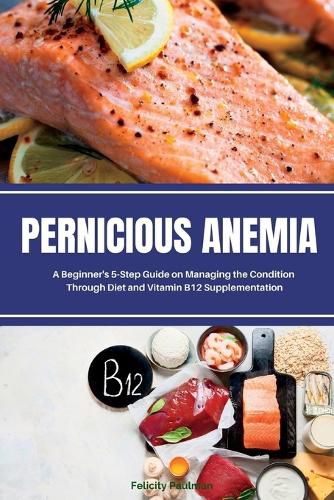Readings Newsletter
Become a Readings Member to make your shopping experience even easier.
Sign in or sign up for free!
You’re not far away from qualifying for FREE standard shipping within Australia
You’ve qualified for FREE standard shipping within Australia
The cart is loading…






This title is printed to order. This book may have been self-published. If so, we cannot guarantee the quality of the content. In the main most books will have gone through the editing process however some may not. We therefore suggest that you be aware of this before ordering this book. If in doubt check either the author or publisher’s details as we are unable to accept any returns unless they are faulty. Please contact us if you have any questions.
Did you know that vitamin B12 deficiency affects not only older adults but also younger ones? Research indicates that up to 6% of adults under the age of 60 suffer from a lack of this essential nutrient. This deficiency can lead to a range of symptoms, including pernicious anemia. Pernicious anemia is caused by an insufficient intake of vitamin B12, which is essential for the formation of red blood cells and nerve function. This can lead to a variety of symptoms such as shortness of breath, fatigue, and difficulty with daily tasks. These symptoms can greatly impact one's life, leading to frustration and a decline in overall well-being. Fortunately, managing pernicious anemia can be done through diet and lifestyle changes. By incorporating certain foods into your diet, such as meat, fish, dairy products, and fortified cereals, you can increase your B12 intake and alleviate symptoms. Supplements and injections may also be necessary to ensure adequate levels of vitamin B12. In this guide, we'll explore everything you need to know about:
What is Pernicious Anemia? Causes, Symptoms, and Treatments for Pernicious Anemia Lifestyle Changes to Manage Pernicious Anemia What is Vitamin B12? How does it Work? Benefits of Vitamin B12 for Pernicious Anemia Different Forms of Vitamin B12 Pros, Cons, and Potential Side Effects Safety Precautions and Considerations Recommended Dosage and Usage of Vitamin B12 Managing Pernicious Anemia Through Diet Food Sources of Vitamin B12 and Sample Recipes
Keep reading this guide to learn more about pernicious anemia, vitamin B12, and how a healthy diet can help manage this condition and improve your quality of life.
$9.00 standard shipping within Australia
FREE standard shipping within Australia for orders over $100.00
Express & International shipping calculated at checkout
This title is printed to order. This book may have been self-published. If so, we cannot guarantee the quality of the content. In the main most books will have gone through the editing process however some may not. We therefore suggest that you be aware of this before ordering this book. If in doubt check either the author or publisher’s details as we are unable to accept any returns unless they are faulty. Please contact us if you have any questions.
Did you know that vitamin B12 deficiency affects not only older adults but also younger ones? Research indicates that up to 6% of adults under the age of 60 suffer from a lack of this essential nutrient. This deficiency can lead to a range of symptoms, including pernicious anemia. Pernicious anemia is caused by an insufficient intake of vitamin B12, which is essential for the formation of red blood cells and nerve function. This can lead to a variety of symptoms such as shortness of breath, fatigue, and difficulty with daily tasks. These symptoms can greatly impact one's life, leading to frustration and a decline in overall well-being. Fortunately, managing pernicious anemia can be done through diet and lifestyle changes. By incorporating certain foods into your diet, such as meat, fish, dairy products, and fortified cereals, you can increase your B12 intake and alleviate symptoms. Supplements and injections may also be necessary to ensure adequate levels of vitamin B12. In this guide, we'll explore everything you need to know about:
What is Pernicious Anemia? Causes, Symptoms, and Treatments for Pernicious Anemia Lifestyle Changes to Manage Pernicious Anemia What is Vitamin B12? How does it Work? Benefits of Vitamin B12 for Pernicious Anemia Different Forms of Vitamin B12 Pros, Cons, and Potential Side Effects Safety Precautions and Considerations Recommended Dosage and Usage of Vitamin B12 Managing Pernicious Anemia Through Diet Food Sources of Vitamin B12 and Sample Recipes
Keep reading this guide to learn more about pernicious anemia, vitamin B12, and how a healthy diet can help manage this condition and improve your quality of life.